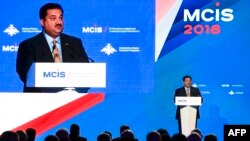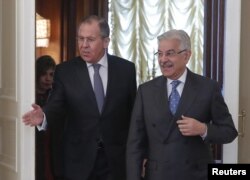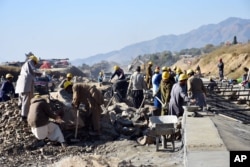Pakistan and Russia have been able to "transcend" their history of mistrust and rivalry, leading to a rapid improvement and expansion in bilateral political, military and economic ties, says Pakistani Defense Minister Khurram Dastgir.
The minister, currently attending an international security conference in Moscow, told VOA prior to his departure that Islamabad sees Moscow's growing involvement in Afghanistan as an important development for promoting peace and countering terrorism in the war-ravaged country.
The Pakistani military and spies played a vital role in helping the United States funnel arms and funds to assist Afghan mujahideen battling the Soviet occupation of Afghanistan in the 1980s, prompting Moscow to sever all ties with Islamabad.
Islamabad's relations with Moscow "stand at a positive place," Dastgir noted. "Both countries have, I believe, been able to transcend their history and to have a fresh beginning."
Dastgir said he was scheduled to meet his Russian counterpart, Sergei Shoigu, on the sidelines of the ongoing security meeting to discuss how to further mutual defense relations.
Washington tensions
The turnaround in bilateral relations comes as Islamabad's decades-old, but often mistrusted, relations with Washington have again deteriorated in recent years.
The tensions primarily stem from allegations Pakistani security institutions harbor and support Taliban insurgents waging a deadly war on Afghan and U.S.-led international forces in the neighboring country.
The bilateral re-engagement between Islamabad and Moscow gained traction in 2014 when the two signed a defense cooperation framework agreement during the Russian defense minister's landmark visit to Pakistan.
Under the agreement, Pakistan has purchased four Russian Mi35 combat helicopters to bolster counterterrorism efforts and delivery of more aircraft is in the works, along with other military hardware.
Energy deals
Pakistani officials say Russia and Pakistan are also in talks for potential multi-billion-dollar energy deals, while Moscow will also build a gas pipeline linking the Pakistani cities of Karachi and Lahore.
"It is a beginning because, of course, that history of mistrust and essentially standing on two opposite sides is there; but, both countries, because of many geo-strategic reasons, now find it a more optimal path to be cooperating with each other," noted Minister Dastgir.
Pakistani and Russian special forces conducted joint military exercises in 2016 and 2017, and plan to do so again this year, focusing on how to counter terrorism in the region.
Dastgir blamed U.S. President Donald Trump's new South Asia strategy for current strains in mutual ties, saying it seeks to scapegoat Pakistan for U.S. military failures in Afghanistan.
The U.S. has, since January, suspended military assistance to Pakistan until the latter takes decisive action against insurgent "safe havens" on its soil. Pakistani officials reject charges the country supports or harbors the Taliban.
Dastgir, however,said, Pakistan's increased closeness with Russia, or deepening of ties with traditional ally, China, "does not take away anything" from relations with the U.S.
'Regional recalibration'
"I want to emphasize that this need not be in any way a zero-sum relationship with the United States. It is just that Pakistan has done a regional recalibration of its foreign and security policies," he said.
Beijing has also undertaken the construction of infrastructure projects and power plants in Pakistan in the past few years, bringing billions of dollars in investment to help the country overcome its economic challenges and energy crisis, a deal that has further cemented ties.
When asked about U.S.concerns that Russia could be attempting to undermine international efforts to stabilize Afghanistan by maintaining ties with the Taliban,the Pakistani minister said Russians are "very much in Afghanistan, they are in contact with them [theTaliban] and they talk to the them."
Moscow publicly acknowledges ties with insurgents but maintains they are meant to promote a peaceful settlement of the Afghan conflict.
Dastgir echoed Russian concerns that Islamic State is increasing its footprint in "ungoverned" Afghan areas, threatening stability of neighboring countries, including Russia's allied Central Asian states. IS has already carried out major attacks in Pakistan.
Afghan peace talks
Both Islamabad and Moscow support efforts aimed at encouraging the Afghan government and the Taliban to open a peace dialogue to end the war and deter terrorists from using the country to destabilize its neighbors, Dastgir added.
"Our role, as we see it, is now merely as facilitators of the dialogue as envisioned by the Afghan government, so we will facilitate. For us, it is a fact that Pakistan's influence, whatever it had over the Taliban, has greatly reduced in the last half decade," maintained the Pakistani minister.
Dastgir was referring to a single meeting Pakistan hosted between Kabul and Taliban negotiators in July 2015. Islamabad maintains it was also able to persuade the insurgents to return to the negotiating table the following year, but a U.S. drone strike killed Taliban chief Mullah Mansoor, scuttling the peace effort once again.
"We will still be able to talk to them but to expect that Pakistan in any way can deliver the Taliban [to the table] is unrealistic," said Dastgir.
Pakistani officials say that in recent years, Iran and Russia's influence with the Taliban has increased and any future Afghan peace process will not be productive without involving these two countries.
U.S. military commanders, however, maintain that Russians are exaggerating the presence of Islamic State in Afghanistan to use it as a pretext to support the Taliban to destabilize the country, a charge Moscow denies.






